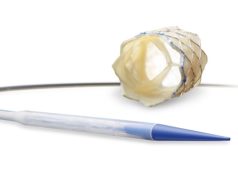
A study presented yesterday at the virtual Society for Cardiovascular Angiography and Interventions (SCAI) 2020 Scientific Sessions (14–16 May, Eastern Time) indicates that the addition of icosapent ethyl to statin therapy in patients with elevated triglycerides and increased cardiovascular risk is associated with reductions in first and repeat revascularisations.
REDUCE-IT was a multicentre, double-blind, placebo-controlled trial, in which statin-treated patients with elevated triglycerides (135–499mg/dL), controlled low density lipoprotein (LDL; 41–100mg/dL), and established cardiovascular disease or diabetes plus risk factors were randomised to receive icosapent ethyl 4g daily or placebo. In the icosapent ethyl arm, the primary composite and other cardiovascular endpoints were substantially reduced. Prespecified analyses examined all coronary revascularisations, recurrent revascularisations, and revascularisation subtypes.
Benjamin Peterson (Brigham and Women’s Hospital Heart & Vascular Center and Harvard Medical School, Boston, USA) and colleague stated that they are not are aware of any other non-LDL based therapy that has been shown to reduce coronary artery bypass grafting (CABG) in a blinded, randomised trial. They concluded that many patients who are treated with stents qualify for treatment with icosapent ethyl, adding that screening for eligibility and starting treatment among patients who undergo cardiac stenting either at the time of the initial procedure or during follow-up could result in a large reduction in the need for repeat cardiac stenting or bypass surgery.
Peterson, who is the lead author of the REDUCE-IT REVASC analyses, said: “Prior therapies aimed at patients with elevated triglycerides have not demonstrated a consistent benefit in reducing coronary revascularisation. We were able to show that treating patients with icosapent ethyl who have elevated triglycerides on statin therapy, and who also have either cardiovascular disease or diabetes plus cardiovascular risk factors, resulted in a significant reduction in revascularization, including coronary stenting and cardiac bypass surgery.”
He added: “Overall, there was a 34% reduction in first revascularisation events, and even higher reductions in subsequent revascularisation events among statin-stabilised patients treated with icosapent ethyl versus placebo. There was also a significant 32% reduction in stenting and a 39% reduction in the need for CABG in this double-blind, placebo-controlled trial with independent adjudication of events,” Peterson explained.













